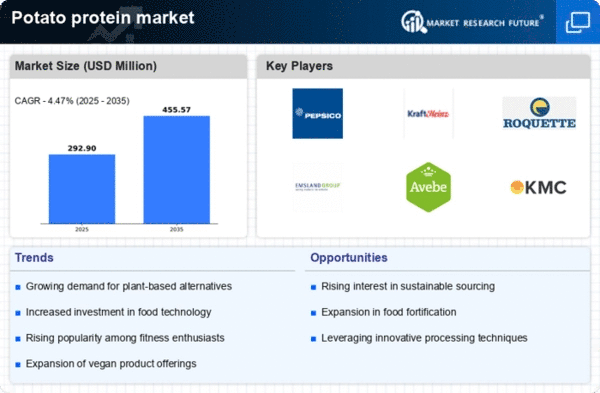Market Trends
Key Emerging Trends in the Potato protein market
The potato protein market is witnessing significant trends, reflecting the growing recognition of plant-based proteins and the versatile applications of potato-derived ingredients. Potato protein, a byproduct of potato starch processing, has gained attention as a valuable protein source with various functional properties. One prominent trend in the potato protein market is the increasing demand for plant-based alternatives in the food and beverage industry. As consumers gravitate towards plant-centric diets for health and environmental reasons, potato protein has emerged as a viable option for product formulations in categories such as plant-based meat alternatives, dairy-free products, and protein supplements. This trend aligns with the broader movement towards sustainable and ethical food choices, driving the adoption of plant-based proteins.
Moreover, the sports and nutrition industry is contributing to the growth of the potato protein market, with an emphasis on clean-label and allergen-free protein sources. Potato protein, being naturally gluten-free and hypoallergenic, is gaining traction as a suitable option for individuals with dietary restrictions or sensitivities. The protein's complete amino acid profile also makes it an attractive choice for athletes and fitness enthusiasts looking for high-quality plant-based protein supplements. This trend reflects the increasing demand for clean and transparent ingredient lists in sports nutrition products.
Additionally, innovation in product development is driving the potato protein market, with manufacturers exploring new applications and formulations. Potato protein's functional properties, such as emulsification and foaming abilities, make it a versatile ingredient in various food and beverage products. From enhancing the texture of plant-based burgers to improving the creaminess of non-dairy beverages, the adaptability of potato protein is expanding its role in the culinary landscape. This trend is encouraging the development of novel products, further broadening the market's appeal.
Sustainability is emerging as a key trend in the potato protein market, with consumers and manufacturers prioritizing environmentally friendly practices. Potato protein is derived from potato processing by-products, contributing to the reduction of food waste. Brands are increasingly focusing on sustainable sourcing, efficient production processes, and eco-friendly packaging to align with consumer values. This sustainability trend not only addresses environmental concerns but also positions potato protein as a responsible and ethical choice within the plant-based protein market.
Furthermore, the market is experiencing a geographical expansion, with increased demand for potato protein in various regions. Europe, in particular, is a significant player in the potato protein market, driven by the region's strong focus on sustainable and plant-based diets. The Asia-Pacific region is also emerging as a promising market, influenced by the growing awareness of plant-based nutrition and the increasing prevalence of vegetarian and flexitarian lifestyles. This regional diversification is shaping the market dynamics, with key players strategically expanding their presence to capitalize on diverse consumer preferences.


















Leave a Comment